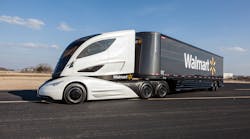Walmart targets gigaton of reduced emissions, big sustainability boost
At Walmart's annual Milestone Summit today, the company launched a sustainability platform inviting suppliers to join in committing to reduce greenhouse gas emissions resulting from their operations and supply chains. Dubbed "Project Gigaton," Walmart says the initiative will provide an emissions reduction toolkit to a broad network of suppliers seeking to eliminate one gigaton of emissions focusing on things like manufacturing, materials and use of products by 2030.
One gigaton, or one billion tons, of emissions is the equivalent of taking more than 211 million passenger vehicles off of U.S. roads and highways for a year, the company points out.
Walmart claims it is the first retailer with a verified science-based target emissions-reduction plan. The company has set targets to reduce emissions significantly by 2025. The retailer will also work to reduce CO2e, or carbon dioxide equivalent, emissions from upstream and downstream sources by a gigaton between 2015 and 2030.
Project Gigaton is part of a series of Walmart sustainability initiatives focused on addressing social and environmental issues in ways that help communities while also strengthening business. For example, by investing in solar energy, Walmart notes it has helped to support jobs for American solar companies. Walmart is now one of America's leading commercial solar and on-site renewable energy users, the company says, and gets about 25 percent of its global energy from renewable sources.
In another example, by doubling the efficiency of its U.S. fleet from 2005 to 2015, Walmart says it saved nearly $1 billion compared to a 2005 baseline.
"We are proud of the improvements we've made in reducing our own emissions, but we aim to do more. That's why we're working with our suppliers and others on Project Gigaton," said Kathleen McLaughlin, senior vice president and chief sustainability officer for Walmart.
Support from environmental advocates
Walmart's summit and new initiatives met with praise from environmental groups. "Today, business stepped up to the plate to lead on climate in a way that supports both people and the planet. Business leadership and innovation have always been an American hallmark, and that's never been clearer than right now," stated Fred Krupp, president of the Environmental Defense Fund. "A challenge like Project Gigaton catalyzes innovative solutions around the globe.
"And it makes clear that companies won't wait — nor should they," he added. "Smart companies like Walmart and the suppliers that will join them on this journey have moved far beyond the false either/or choice of a healthy economy or a healthy environment. We need both, and these businesses are leading the way."



